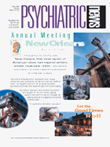New Orleans can be a place for great celebration and revelry, but it can also be a place for discussion about issues most pressing to psychiatric patients. At this year’s annual meeting, the AIDS Education Project and the APA Commission on AIDS will conduct several activities that will address important aspects regarding the care of HIV-positive patients with psychiatric complications.
Because of powerful antiretroviral treatment combinations, the rate of progression to AIDS has declined over the past few years, but the rate of infection has not. As people live longer, psychiatric manifestations are expected to increase because of HIV’s ability to enter the brain in the early stages of the disease. Constantly changing treatments and psychiatric research make updates essential for any psychiatrist who may see an HIV-infected patient.
This year’s education programs are designed to complement APA’s Practice Guideline for Treatment of Patients With HIV/AIDS. In addition, the programs aim to be useful to psychiatrists with varying levels of knowledge and experience and will provide updated information on HIV treatments and complications, as well as on the psychiatric treatment and psychosocial issues of patients living with HIV.
• Residency Training Program, Sunday, May 6, noon to 4:30 p.m.: This year’s Residency Training Program provides residents with practical information on neuropsychiatric aspects of HIV, drug-drug interactions, ethical dilemmas in treating patients with HIV, and a model for complex clinical decision making. Discussion and case studies will allow residents time to deepen and integrate the lecture material. Seats must be reserved by April 23 by calling (202) 682-6147.
• Symposium, “Treating the Psychiatrically Ill HIV Patient,” Part I, Monday, May 7, 2 p.m. to 5 p.m.: Part I of this symposium will focus on treatment approaches to HIV-related cognitive disorders, mood disorders, complications of drug-drug interactions, and psychotic disorders. A panel discussion will allow participants to present questions and comments, as well as actual cases for discussion and integrated learning.
• Symposium, “Psychotherapeutic Aspects of HIV,” Part II, Tuesday, May 8, 2 p.m. to 5 p.m.: Part II will address shifting patient populations and cultural concerns, the role of psychiatry in HIV counseling and testing, psychotherapy with people living with HIV disease, and therapeutic interventions with the high-risk patient. As in Part I, a panel discussion will address questions and comments as well as invite actual cases for dialogue.
• Workshop, “The Use of Anabolic and Androgenic Steroids in HIV Disease,” Thursday, May 10, 9 a.m. to 10:30 a.m.: This workshop, sponsored by the APA AIDS Commission, will provide information on the clinical manifestations of hypogonadism in HIV disease and the use of testosterone and other anabolic and androgenic steroids for replacement therapy. This workshop will briefly present the clinical manifestations of hypogonadism in HIV disease and the use of testosterone and other anabolic and androgenic steroids for replacement therapy and as adjunctive therapy for mood disorders and lypodystrophy syndrome. The discussion will focus on assessment and treatment issues for both patients and providers, addressing short- and long-term concerns. Countertransference issues of other health care providers toward HIV-infected people wanting to resume an active sexual life will also be discussed.
• AIDS Resource Center, Saturday to Thursday, May 5 to 10: Located in the Exhibit Hall, the AIDS Resource Center will offer national and local HIV/AIDS-related clinical and patient information. Resources will include books, newsletters, training curricula, pamphlets and brochures, articles, and lists of Web resources. Stop by to learn more about APA’s AIDS education and training initiative. ▪
